Opening Session Keynote Speakers Offer Hope, Humor
The Opening Session of VenueConnect 2017 offered hope for the country in times of terrorist turmoil as Acting Secretary Elaine Duke of the Department of Homeland Security pledged the support of her office in helping keep venues safe as a place where people go to assemble and enjoy a variety of events.
When she finished her comments, it was time for local entertainment executive Adam Black to interview fellow local actor, singer, and comedian Chip Esten, on the subject of playing venues and looking at some of Esten’s career highlights which include his current role on CMT’s “Nashville” as Deacon Claybourne.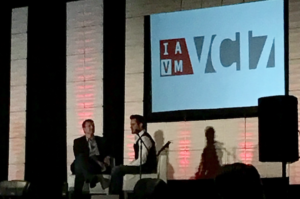
It was hope, humor, and inspiration all rolled tidily into a morning grand ballroom session in front of a packed audience.
Deputy Secretary Duke connected quite personally with her audience, nothing IAVM’s long-standing partnership with the DHS. It was also quite obvious that Duke is a frequent patron and consumer of the events held in public assembly venues.
“These are places where we share good memories and experience great things together,” she said.
Duke specifically mentioned the attack at the Manchester Arena following an Ariana Grande concert that resulted in the deaths of 22 people and the injuries of several more innocent guests, many of them children.
“The youngest to die was eight-years-old,” she said. “That is the same age as my granddaughter. It makes it personal.”
Duke further noted the work being done in Washington, D.C., to combat terrorism, whose primary function short of inflicting fatalities is to create fear in people.
“They are bringing the battleground to our civil streets,” Duke said. “They want to shock and mortify and attack innocent people in places we think are safe.”
The ISIS propaganda machine is a well-oiled one, she noted as she discussed an article coming out from the terrorist organization entitled “How to make a bomb in the kitchen of your mom.” Duke said that since 2013 the group has been linked to 200 threats, with the United States the ongoing top target.
“We are tracking over 1,000 homeland terrorist cases, but it’s the ones not on our radar that we are concerned about,” she said.
Duke added that security is a shared responsibility and the work of Protective Security Advisors (PSA) in supporting the NCAA, Super Bowl, and other major events. Some measures that venues can take to solidify security is to connect by reaching out to the local community, especially law enforcement, plan by thinking about how to handle emergencies and suspicious packages, train by knowing where to call and what to do, and report by saying something when seeing something.
“We cannot be afraid to live our lives,” she said. “We should all be able to go and sing at the concerts and buy tickets to The Nutcracker.”
After the Acting Secretary concluded her poignant remarks, it was time for Esten to take the stage … belatedly but with just cause, according to the actor, singer, and comedian. “It was because of the Secret Service,” he said. “I see these men and just walked back to my dressing room.”
From there it was time for Black to ask the questions and Esten to share a career’s worth of experiences, many of which obviously included performances at IAVM member venues. He specifically noted performances at the Kennedy Center, Carnegie Hall, and at the White House, where “the Secret Service is there, too! The venue, though, was a spectacle as much as the show itself.”
Esten shared some of his upbringing and interest in comedy, acting, and singing and knew that he wanted to make people laugh. It was more than that, though, as he added that he wanted to act to make people cry and get angry, which led to the acting career.
Esten talked about how the venue made the show almost as the show made the venue.
“The great venues can create an experience,” he said. “They are like classic books. It is always the little things, though, that make or break a show. Having a great staff is key. It’s really true that it’s not just the artist that makes the show. It’s the venue. A great venue and a great staff can just lift you up.
“Security people, golden employees … those take what they do and make it their life work. They’re smiling and they give support. You can tell the places that care. It makes the night very, very special.”
Just as Acting Secretary Duke and Esten made the Opening Session morning special.
VenueConnect EMSSI Update
Education kicked off at VenueConnect 2017 in Nashville with a hot-off-the-press update on the Exhibitions and Meetings Safety and Security Initiative (EMSSI),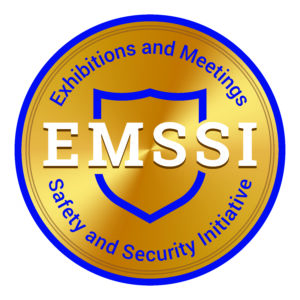 including a decorated panel of four who spoke and then fielded questions from the audience.
including a decorated panel of four who spoke and then fielded questions from the audience.
Panelists Bruce Davidson, Office of SAFETY Act Implementation, U.S. Department of Homeland Security, Bill Flynn, GARDA Risk Management, Matt Dimmick, Ross & Baruzzini, and Fred Peterson, Massachusetts Convention Center Authority, took turns discussing various facets of EMSSI and the progress being made toward its inception and application for those in the convention center world who apply for the designation.
“We are not a regulatory program,” noted Davidson in alleviating concerns that when finalized EMSSI could be mandated. “I’m not going to tell you what to do but can make observations. We are proactive, though, and like to engage deeply with your industry.”
All panelists agreed with the comments made before the group discussion by IAVM President/CEO Brad Mayne, CFE, who said that the responsibility for venue safety and security is a shared one and should not be totally thrust on the venue managers.
“The idea for EMSSI was to bring together these various organizations that have a stake in the matter,” Flynn said. “I agree with Bruce. The last thing you want is the government telling you what to do. We’ve seen Congress institute regulations in other areas, but you as venue managers are ahead of the curve and not standing by but actively involved. EMSSI gives you a seat at the table.”
Flynn said that EMSSI’s ultimate goal is to have a security guideline submitted to the SAFETY Office. He spoke about the pilot programs held in Houston and Overland Park (KS) and how those convention center venues have worked through the process.
Dimmick was brought in as a third-party to focus on the pilot assessments in Houston and Overland Park.
“The final outcome of our review was a comprehensive report in a continuous performance process,” he said. “We review in comparison to other guidelines from DHS or other sports leagues, such as a glossary of terms.”
Peterson has five venues under his authority currently going through the process of application. Despite dealing with an application of some 144 pages, Peterson said that the effort has been made somewhat better thanks to following a parallel path of the application by nearby Gillette Stadium.
“It has definitely helped us walk through the process quicker and really striking while the iron is hot,” he said. “We have five venues with over 300 events in a calendar year. As we invest millions in safety and security, we want to make sure we have this program in place. It took Gillette nine months. We need to have patience on the timing aspect. This is not just about venues, but our contract partners and show organizers as well.”
Post-panel comments centered on the portal still under development and the actual document review process from the DHS.
Through it all, Davidson said that one objective from his office is to act with a sense of urgency for those who apply. As all panelists noted, there is no set calendar for the next terrorist strike.
“It is better to be ready today than have to explain why we’re not ready,” Davidson said.
Acting Secretary of the DHS Elaine Duke Talks Freedom In Meet-And-Greet
Following her stirring comments at the Opening Session, Elaine Duke, Acting Secretary for the Department of Homeland Security spent a few extra minutes briefly addressing and meeting some IAVM members in a meet-and-greet where she reinforced the resolve of citizens in the wake of uncertain times.
“Assembling at events is so important to our American fabric,” said the Deputy Secretary, “not only from terrorists striking, but even from making us afraid. I hope that everybody knows their Protective Service Advisors (PSA), because we 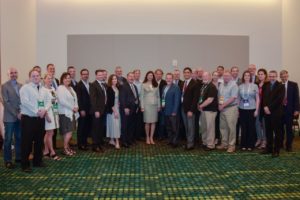 are here to serve you and help build best practices.”
are here to serve you and help build best practices.”
IAVM President and CEO Brad Mayne, CFE, shared with the Secretary progress on the Exhibitions and Meetings Safety and Security Initiative (EMSSI) and that many in the room are involved as Industry Security Council members.
Security Duke concluded by shaking hands and having brief individual conversations before leaving the group with one final thought.
“As Americans we shouldn’t be afraid, because that’s not our nature,” she said. “They have a saying up on the Beltway that if you drive the Beltway you shouldn’t be afraid of anything.”
Participants Gathered At VenueConnect For UpStart
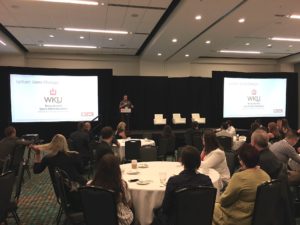
On Monday morning, students and young professionals gathered at VenueConnect for UpStart: a program that provides education and networking to individuals who are just starting their careers in venue management.
Dusty Saine began the session by reminiscing about his own IAVM conference experience.
“I sat in your seat thirteen (13) years ago,” said Saine. He encouraged the participants, giving them advice (be excited and inspired) on how to prepare for the next few days of the conference, before he introduced the audience to Dr. Brad Stinnett, Western Kentucky University (WKU) Assistant Professor.
Stinnett thanked the committee and expressed his excitement about UpStart’s growing attendance—forty-seven (47) participants and twenty-two (22) executives, an exciting turnout.
“It speaks volumes about where you want to go in your careers,” he said. “Kudos to you.”
WKU has sponsored UpStart since its inception in 2015 and has been involved in its administration and planning ever since. The collaboration between WKU and IAVM reflects the university’s “student-first” philosophy and eagerness to help young professionals get involved.
“As educators, we are in the business of providing opportunities for students to fulfill the dream of having impactful and rewarding careers,” said Stinnett. “By supporting the UpStart program, WKU is playing a vital role in the continuous development of students and young professionals of the International Association of Venue Managers.”
But the program not only benefits students and young professionals, but mentors as well!
“The UpStart program is a win-win for young professionals and mentors participating,” said Stinnett. “The young professionals are given first-hand access to some giants in the venue management industry…on the other hand, the mentors are able to visit with the next generation of leaders in the industry and share a tremendous amount of knowledge regarding the diverse aspects of their careers.”
Before the participants broke away and teamed up with executive mentors, Stinnett challenged them to get as much out of this conference, and its opportunities, as they can.
“Enjoy the ride, maximize your experience, and maximize your career.”
VenueConnect Begins Conference With DirectConnect
 Like most members who came to VenueConnect on Sunday, Ross Girouard started his morning with DirectConnect.
Like most members who came to VenueConnect on Sunday, Ross Girouard started his morning with DirectConnect.
“It’s a good time to sit down and get undisrupted face-time with a response,” said Ross Girouard, Director of Operations and Productions of Allen Event Center.
DirectConnect Hosted Buyer Program is an opportunity that connects venue professionals with vendors. Members attending the event walk into an open conference room in the Omni Nashville Hotel for ten (10) brief, one-on-one appointments with companies that are ready help venue professionals with their upcoming projects.
Sunday was Girouard’s first DirectConnect experience. He’s hoping to help the center stay competitive and create exciting opportunities for their consumers. He’s looking to make small renovations, replace inventory, and make some cosmetic changes to the venue, but also hoping to find new products that would help create more opportunities.
Girouard heard about DirectConnect while he was at Venue Management School (VMS), 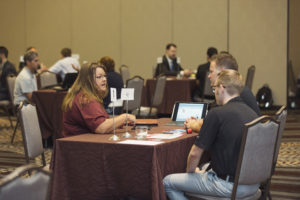 where he met Tori Morgensai, a Production Manger from the Englert Theatre in Iowa City, Iowa. Morgensai is looking to make “large renovations” to the Englert Theatre and came to DirectConnect to learn about renovation and restoration techniques, as well as the vendors who can help preserve the historical building.
where he met Tori Morgensai, a Production Manger from the Englert Theatre in Iowa City, Iowa. Morgensai is looking to make “large renovations” to the Englert Theatre and came to DirectConnect to learn about renovation and restoration techniques, as well as the vendors who can help preserve the historical building.
Amanda Bakkedahl, a Marketing and Sales Manager for the Bismarck Event Center in Bismarck, North Dakota, is hoping to learn more about the industry’s standards and how to boost her venue’s overall fan experience. Being new to the program, DirectConnect was recommended to her by her supervisor, a long time attendee of IAVM conferences.
Jim Barbatti and Becky Vetter came VenueConnect to represent the Show Me Center for Southeast Missouri State University and hope to find vendors that meet their specific needs. The thirty-year old venue is needing to update its technology, so the pair came to DirectConnect to find vendors that can meet their needs. Baratti, Assistant Director of the Show Me Center, was eager to meet face-to-face with vendors and reintroduce himself to vendors the Center has worked with in the past.
“We’re looking to buy soon,” said Baratti. He’s anxious to get involved with vendors here at DirectConnect to see what options are available. For Vetter, Business Manager of the Show Me Center, this is her first time at VenueConnect and interested in seeing what the conference has to offer. She’s excited for the Trade Show, specifically focusing on “vendors who provide POS systems”.
Do you want to receive a Front Row News weekly digest?
Categories
- Allied (861)
- Architecture (147)
- Arenas (747)
- Career (897)
- Convention Centers (895)
- Education (623)
- Events (1,544)
- Food & Beverage (193)
- Foundation (113)
- Guest Experience (1,496)
- Industry News (2,270)
- Leadership (1,888)
- Marketing (150)
- Membership (2,000)
- Music (213)
- Performing Arts Centers (454)
- Professional Development (409)
- Research (127)
- Safety & Security (442)
- Sports (763)
- Stadiums (608)
- Student (159)
- Technology (516)
- Ticketing (92)
- Touring (82)
- Trends (364)
- Uncategorized (745)
- Universities (218)
- Video (25)
- Young Professional (198)
Twitter Feed
- Twitter feed loading
Recent Posts
- VenuWorks Selected To Manage Historic Paramount Arts Center In Ashland
- Miami Beach Convention Center Wraps a Milestone Year
- Venuworks and ATG Entertainment Selected to Manage Fresno Convention and Entertainment Center
- Seattle Convention Center Announces Strategic Leadership Appointment and Growth Initiatives for 2026
- Peggy Daidakis Humbly Made Convention Center History
Categories
- Allied
- Architecture
- Arenas
- Career
- Convention Centers
- Education
- Events
- Food & Beverage
- Foundation
- Guest Experience
- Industry News
- Leadership
- Marketing
- Membership
- Music
- Performing Arts Centers
- Professional Development
- Research
- Safety & Security
- Sports
- Stadiums
- Student
- Technology
- Ticketing
- Touring
- Trends
- Uncategorized
- Universities
- Video
- Young Professional
Archives
- January 2026
- December 2025
- November 2025
- October 2025
- September 2025
- August 2025
- July 2025
- June 2025
- May 2025
- April 2025
- March 2025
- February 2025
- January 2025
- December 2024
- November 2024
- October 2024
- September 2024
- August 2024
- July 2024
- June 2024
- May 2024
- April 2024
- March 2024
- February 2024
- January 2024
- December 2023
- November 2023
- October 2023
- September 2023
- August 2023
- July 2023
- June 2023
- May 2023
- April 2023
- March 2023
- February 2023
- January 2023
- December 2022
- November 2022
- October 2022
- September 2022
- August 2022
- July 2022
- June 2022
- May 2022
- April 2022
- March 2022
- February 2022
- January 2022
- December 2021
- November 2021
- October 2021
- September 2021
- August 2021
- July 2021
- June 2021
- May 2021
- April 2021
- March 2021
- February 2021
- January 2021
- December 2020
- November 2020
- October 2020
- September 2020
- August 2020
- July 2020
- June 2020
- May 2020
- April 2020
- March 2020
- February 2020
- January 2020
- December 2019
- November 2019
- October 2019
- September 2019
- August 2019
- July 2019
- June 2019
- May 2019
- April 2019
- March 2019
- February 2019
- January 2019
- December 2018
- November 2018
- October 2018
- September 2018
- August 2018
- July 2018
- June 2018
- May 2018
- April 2018
- March 2018
- February 2018
- January 2018
- December 2017
- November 2017
- October 2017
- September 2017
- August 2017
- July 2017
- June 2017
- May 2017
- April 2017
- March 2017
- February 2017
- January 2017
- December 2016
- November 2016
- October 2016
- September 2016
- August 2016
- July 2016
- June 2016
- May 2016
- April 2016
- March 2016
- February 2016
- January 2016
- December 2015
- November 2015
- October 2015
- September 2015
- August 2015
- July 2015
- June 2015
- May 2015
- April 2015
- March 2015
- February 2015
- January 2015
- December 2014
- November 2014
- October 2014
- September 2014
- August 2014
- July 2014
- June 2014
- May 2014
- April 2014
- March 2014
- February 2014
- January 2014
- December 2013
- November 2013
- October 2013
- September 2013
- August 2013
- July 2013
- June 2013
- May 2013
- April 2013
- March 2013
- February 2013
- January 2013
- May 2012
- March 2012
- December 2011
- November 2011
- October 2011
Recent Comments
- Frank Bradshaw, Ph.D., CVE on John Meyer, CVE, a Tireless Advocate of Certification for Venue Professionals, Has Died
- Neil Sulkes on Hilary Hartung, Friend to Many in Venue Marketing, Has Left Us
- Jason Parker, CVE on The Devastation of Hurricane Helene and How We Can Support One Another
- Larry Perkins on Touhey Testifies Against Speculative Ticketing Before Congressional Subcommittee
- Peter Secord on Major Players for Planned Elkhart Amphitheater Were in the Mix at VenueConnect
